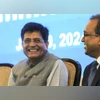Union Commerce and Industry Minister Piyush Goyal on Wednesday expressed the government’s commitment to staying on the reform path while addressing concerns of the common man.
Goyal was speaking at an industry event less than a fortnight before the Union Budget for 2024-25. He also sought greater industry participation and investments in research & development and innovation to achieve the Viksit Bharat goal.
Goyal was speaking at an industry event less than a fortnight before the Union Budget for 2024-25. He also sought greater industry participation and investments in research & development and innovation to achieve the Viksit Bharat goal.
At the same event, organised by the Federation of Indian Chambers of Commerce & Industry (Ficci), the minister raised concern over the decline in electric vehicle (EV) sales in India during the April-June quarter, and prodded industry to push for its greater adoption. “I was pained when I saw the number of electric vehicles sold in India had fallen in the past quarter. I was truly, truly pained.” The industry should move towards greater adoption of EVs, he said.
Elaborating on the government’s reform agenda, the minister said: “All of us are deeply committed to persevering for reforms. The way we have done it in the first 10 years -- a calibrated reform -- takes India to the next level and grows our economy.” He added that the government would ensure that people’s income grows and that the common man is equally in a position to enjoy the basic needs, such as food, clothing, shelter, health, education, good road connectivity, electricity and water in each home, improved railway services, and air connectivity. “Going forward, cooking gas in each home through piped connection... all of these and many more things are on the agenda for the next five years. Some of these will be initiated in the next 100 days,” Goyal said.
On EVs, he said: “I suspect nobody in this room possibly put an effort to move their employees to use electric vehicles… then automatically charging system will start growing… automatically the ecosystem will improve. With scale, the cost of automobile will come down.”
Sales of EVs during April-June contracted 7 per cent year-on-year to 346,024 units, data from the Ministry of Road Transport and Highways’ VAHAN portal showed.
Sector experts said the sharp sales decline could be due to a combination of factors, including changes in government policies and customers’ interest shifting towards hybrids.
More From This Section
“Low incentives for e2Ws (electric two-wheelers), increasing consumer confidence in hybrids, lack of robust charging infrastructure, and high EV prices are all impacting EV sales,” said Preetesh Singh, specialist, CASE and Alternate Powertrains at Nomura Research Institute.
EV sales started declining in July 2023. The fall was triggered by the Centre's decision to reduce the maximum subsidy for e2Ws from about Rs 60,000 to around Rs 22,500, which resulted in an increase of more than 20 per cent in the average price of an e2W. In April this year, the government further reduced the subsidy by half.
Viksit Bharat
Goyal said in order to achieve the ‘Viksit Bharat’ vision, the industry needed to come forward to collaborate and invest more in research & development, innovation, and sustainability. He also urged the industry to be more “demanding” and “proactive” in providing suggestions to the government.
The government, he added, was in the process of finalising the ‘Jan Vishwas 2.0’. “How can we converge industry’s interests with national goals? A lot more needs to be done but we need you (industry) to come forward and give a balanced view on what is necessary, along with the pain points regarding decriminalisation and reducing the compliance burden,” the minister said.
Goyal further said the government, along with industry, remained deeply committed to achieving the $2 trillion export target by 2030. “It is doable, achievable, with the right building blocks in place along with a strong macroeconomy to support it,” he said.
Other issues
The minister said Indian exporters were conscious about quality standards and the problem with some consignments of spices was ‘very, very’ minuscule and need not be ‘exaggerated’.
The consignments that had some problems were minuscule compared to India's $56 billion exports of food and related products. “I think the media should resist exaggerating one or two incidents... They were company-specific issues which are being addressed between FSSAI (the Food Safety and Standards Authority of India) and the authorities concerned,” Goyal told reporters.
Goyal’s comments came against the backdrop of the recall of spices of India-based Everest and MDH by Singapore and Hong Kong for allegedly containing pesticide ‘Ethylene Oxide’ beyond permissible limits.
“India is very proud of its quality standards. Indian industry, trade and exporters are very conscious about maintaining very high quality standards and therefore our exports of agri and agri-related products are continuously increasing,” the minister said, adding that even the consignments originating from developed countries were rejected on quality issues.
Government data showed that spice exports dipped by 20.28 per cent to $361.17 million in May.

)
